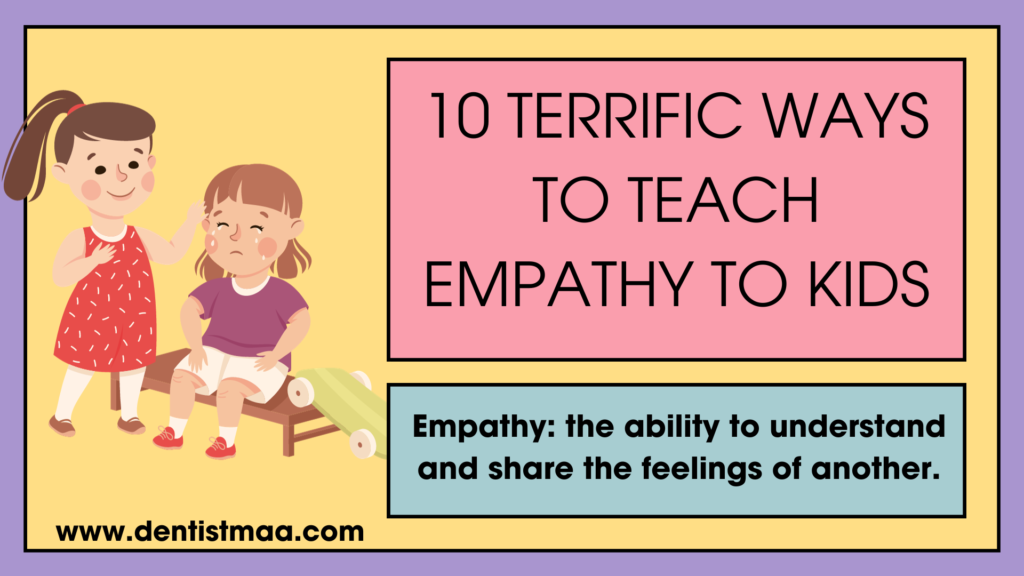Empathy is one of the best things you can ever teach your child. It makes life more livable I would say. But what exactly is Empathy??
Empathy is defined as “the ability to sense other people’s emotions, coupled with the ability to imagine what someone else might be thinking or feeling.“ For example, Your child falls, gets hurt and starts crying. You can show your empathy to the child by saying, “Oh it is really sad that you fell and hurt your knee. I am sure it must be hurting badly. Come let’s apply some ointment on it.” This is you showing empathy to your child.
Your child will understand that you care for her, and in future, she will imitate it when you or any of her friends get hurt. Slowly the child might understand the word empathy but she will start feeling and will start comforting you when you get upset or get hurt.
Why do we need to teach Empathy to our children?
Empathy is very important for healthy relations in life. Before we judge someone we need to understand that person’s feelings. This understanding is known as empathy. And if we do not do that, we might judge the other person wrong, and spoil our relationship. Also if we are empathetic we are more kind and generous towards others.
An empathetic child will not only be caring for his or her family and friends but also the animals and plants, which is an amazing thing to see. Empathy makes the world a better place to live in. So, children should be taught empathy from a young age itself. It becomes very difficult to change yourself once you are an adult. So, the earlier the better.
Terrific Ways to teach Empathy to children
1. Be a role model
Whatever we teach our kids, the first step is to do it ourselves. Modelling empathy is the best way to teach empathy. Show your child that you care for them, and others as well. So how can you be empathetic yourself?
– Talk to your child politely every time and listen to what she has to say.
– Try to understand what the other person’s point of view is even if it is not the same as yours.
– Smile at another person when you meet them and say hello.
– When someone is sick ask them how they are doing, and wish them get well soon.
Just being good to others can set a very good example of empathy. They say you should put yourself in the other person’s shoes before judging anyone. That is empathy. Children might not say anything but they look and listen to everything we do and say. So, they are learning from our behaviour every minute of every day.

2. Validate your child’s emotions
Everyone’s emotions are important. We can not ignore a child’s emotions thinking that she is just a child, what does she know, or she will not remember anything.
Validating a child’s emotions is as important as an adult’s. The child has feelings and we should understand that. This doesn’t mean if the child is throwing a tantrum so that you get her another toy or an ice cream, you give in thinking the emotions are important. Validating a child’s emotions means knowing that the child is genuinely feeling sad, or angry or hurt. So, here you listen to the child, ask her about her opinion and reasoning and then think about what needs to be done.
For example, you are planning a family vacation, and you decide to go to the mountains. But your 10-year-old wants to go to the beach. So, when she hears the plan she is not very excited or happy. You see the look on her face and get upset saying, “I am taking you on a vacation and you still are not happy. This is not the way things go. You should appreciate what we are doing for you.” She just quietly goes to her room and closes the door.
So, what just happened was, that no one asked her where she wanted to go, and no one asked her why was she not happy. What was the right way here? She should have been part of the discussion, as her point of view matters. If it was not possible to go to the place she likes, there should have been a mutual decision made, and come to a condenses, rather than pointing fingers at her and not validating her feelings.

3. Talk about emotions
Talking about emotions is very important for children to understand that every feeling is important. Tell them every emotion they feel is very important and they can share with you anything when they are sad or even angry.
If your child is not talking to someone, maybe your friend, don’t just ask them to start saying hello, and shaking hands. Tell them it is okay, and ask them what upsets them the most. When they say they will not sit with one of their friends tomorrow at school then, don’t just say no you have to. Ask them what is wrong and why are they angry at their friend.
When they are crying for a small thing don’t say there is nothing to cry in this. Instead, ask them what is upsetting them. Another important thing is never to tell a boy that “boys don’t cry” or “he is being a girl” if he is crying. Everyone has feelings, whether it is a boy or a girl. Emotions are the same for all.

4. Teach through pretend play
Pretend play is one of the most incredible and successful ways of teaching kids almost everything. The same goes for teaching them empathy. For example, you can pretend that the bunny (toy) is sick and his parents are taking him to the doctor. Bunny’s friends saw this and in the afternoon they came to bunny’s place with some fruits and asked him how is he doing now. So, bunny felt very happy that his friends had come to see him when he was sick. So, along with playing and spending time with your child, you taught them empathy.
When you teach kids while pretend playing with them, they understand better and they will grasp better.

5. Apologise if you did something wrong
Yes! you can apologise to your child and there is nothing wrong with it. Saying “I am sorry” when you did something wrong or say something bad to your child is totally normal. It doesn’t matter that they are your kids and you are their parents. Saying sorry means you understand that can feel bad too, and you love them. You know it is the right thing to do. When you say sorry, the child understands there is nothing wrong in saying sorry for something you did wrong.
They will see you modelling empathy by understanding your feelings or the other person’s whoever you said sorry to. So, never hesitate to say sorry when you were wrong.

6. Read books that show empathy
Books are again another amazing way of teaching every good thing to a child. When you read to them, they will try to imagine themselves in the other person’s shoes and understand the meaning and importance of being empathetic. So read to them at least once a day.

7. Use the word “I”
“I” is a very important and powerful word. Using it when required is essential to let the child understand it’s importance.
I feel happy today.
I got hurt.
I am feeling excited about our playdate today.
I meant it, so please don’t do it.
Please don’t tickle me as I said no.
So, “I” here is a very important noun, as the child slowly starts understanding why is it important to listen to the other person and validate the other person’s feelings. It will also help in teaching the importance of saying “no.”

8. Praise the child when the child shows empathy
Slowly the child will start showing empathy. And when the child does that, praise the child. It will motivate the child to be even more empathetic and caring. For example, when you get hurt or you are sick, and your child asks you “How are you feeling now?”, tell the child how you are feeling and hug and kiss her saying “Thank you for asking”.
Children love appreciation and when you do that it boosts them even more and releases their good hormones, which will again be of so much benefit to the child’s mental and physical health.

9. Talk about your feelings
Always talk to the child about your feelings, good or bad. All feelings are important. When you talk about your feelings, the child will talk about her feelings to you. It becomes a win-win situation. First, the child will be expressing everything and you will come to know all about her day. Second, the child is learning the importance of feelings, and therefore empathy.
When you share your feelings with them, they get a signal that it is important. so, they start validating your feelings too. When they validate your feelings, they learn empathy.

10. Be patient
Patience is the key to almost everything. Be patient. Your child will not learn empathy in a day or a month. It will take time for them to understand its importance. So, give them some time to understand, until then keep modelling empathy. A child as young as 4 years of age can start showing empathy towards others. But some children might take a little longer time. do not worry, and keep being empathetic yourself.

Empathy is learned more by understanding. When you tell them to be empathetic they will not understand that. But when you model it to them, read stories or show videos to them, they will slowly start understanding. So, make sure you do that on a day-to-day basis and not just once in a while, and slowly you will start seeing the difference. Be patient and trust yourself and your child.
Happy Parenting!
(Empathise, care, caring, feel, feeling, emotions, emotion, validate, child, children, caregiver, parents, mother, father, I, me, myself )




